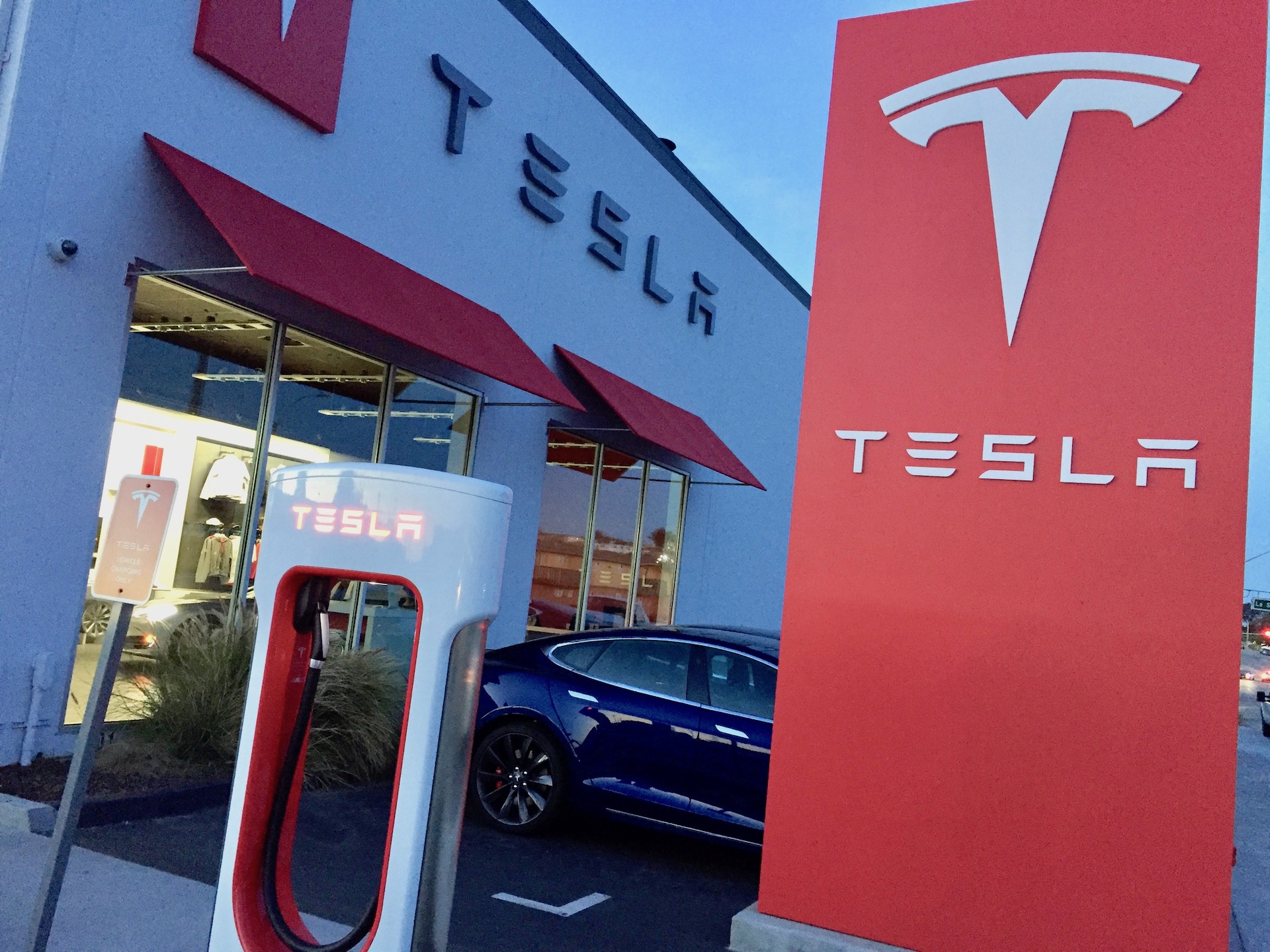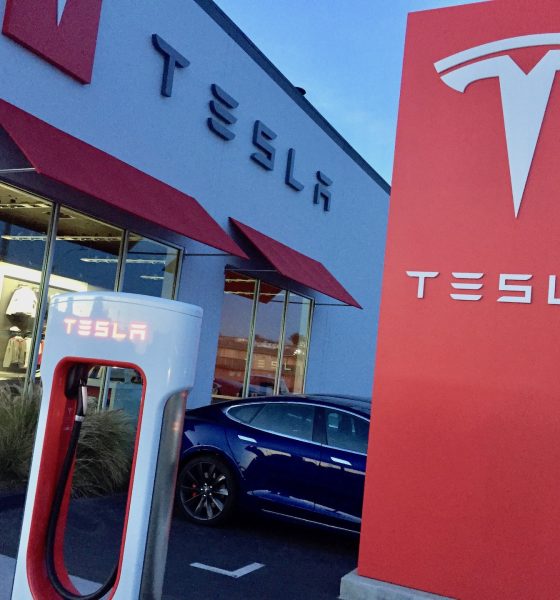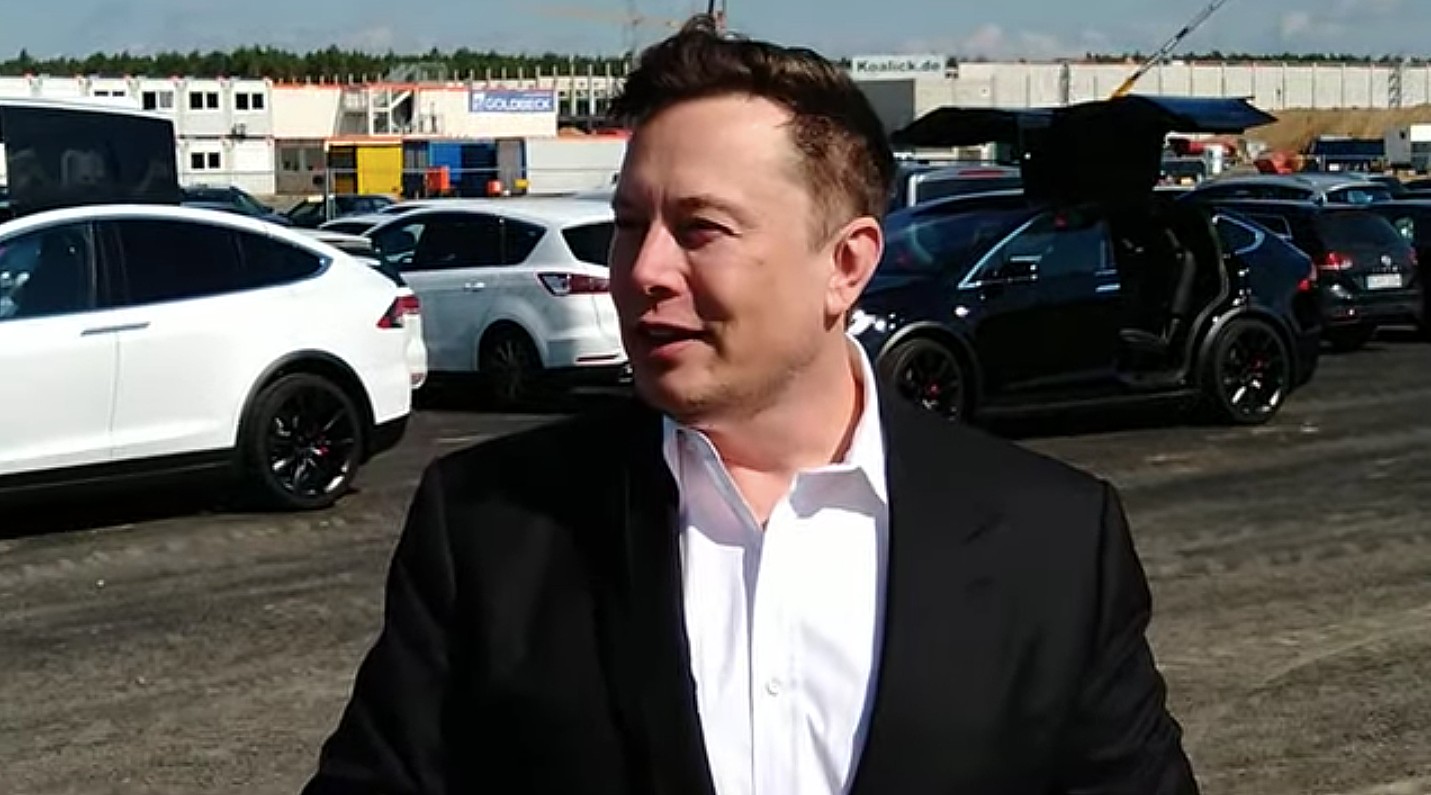

Investor's Corner
Tesla sued by JPMorgan over Musk’s 2018 ‘funding secured’ Tweet
Tesla is being sued by JP Morgan Chase in a massive $162 million lawsuit over stock warrants linked to CEO Elon Musk’s infamous “funding secured” Tweet from 2018 when Musk hinted toward taking the company private at $420.
Court filings made public on Monday and reported by Barron’s showed JPMorgan Chase is alleging Tesla of branching a contract in regards to the repricing of warrants. Following Musk’s Tweet in 2018 that hinted he was thinking of taking Tesla private at $420 per share, the stock responded with volatility, which caused losses. JPMorgan Chase’s lawsuit outlines a potential payout of $162.2 million, plus interest, fees, and expenses.
JPMorgan filed the complaint in the Southern District of New York, and details a contract with Tesla where the automaker was legally obliged to deliver shares or cash if the stock price passed certain levels by a certain time. This is known as a “strike price.” Barron’s said this was a stock warrant transaction, which is similar to stock options contracts available to retail investors.
The lawsuit’s most critical point is that Tesla did not deliver the cash or shares. JPMorgan was forced to reprice the stock warrants after Musk Tweeted, “Am considering taking Tesla private at $420. Funding secured. Shareholders could either to sell at 420 or hold shares & go private.”
Shareholders could either to sell at 420 or hold shares & go private
— Elon Musk (@elonmusk) August 7, 2018
Musk’s Tweet resulted in a settlement with the SEC, which required the CEO to step down as Tesla’s Chairman, pay a $20 million penalty, appoint two new independent directors to the Tesla board, and “establish a new committee of independent directors and put in place additional controls and procedures to oversee Musk’s communications.”
The Tweets spiked Tesla’s stock price, which, in turn, caused JPMorgan to readjust the value of the warrants. After Musk and Tesla confirmed a few weeks later that the stock would not be taken private, JPMorgan readjusted the value of the warrants once again. Tesla sold warrants to JPMorgan with provisions that protected both entities from potential volatility that could come from significant corporate transactions, according to JPMorgan. The provisions gave the banking firm the right to adjust and readjust the warrants in cases of significant announcements that could cause stock movement. JPMorgan said the provisions were put in to protect both parties from “exactly the type” of announcement that Musk Tweeted.
Tesla, however, did not take kindly to JPMorgan repricing the warrants and stated that the bank’s move was “unreasonably swift and represented an opportunistic attempt to take advantage of changes in volatility in Tesla’s stock,” according to a letter that was included in the filing.
Credit: Tobias Lindh/Youtube
JPMorgan did not readjust the strike price following the second modification, the filing said, as the warrants expired in June and July 2021. Tesla’s stock rose nearly 900% from the 2018 Tweet to the end of July 2021, most of the growth taking place during 2020, when TSLA shares rose over 700%. The prices were above the original and readjusted strike prices.
The lawsuit said that Tesla and the bank have agreed that the automaker should settle the undisputed number of shares earlier in 2021. However, Tesla is still uneasy with the fact JPMorgan readjusted the strike prices, but JPMorgan said that failure to settle the adjusted strike price could conclude with a default. JPMorgan’s suit said Tesla failed to deliver 228,775 shares, meaning the bank is stuck with an open hedge position that equals the shortfall. “Even though JPMorgan’s adjustments were appropriate and contractually required, Tesla has refused to settle at the contractual strike price and pay in full what it owes to JPMorgan,” the firm said in its complaint. “As a result, more than $162 million is immediately due and payable to JPMorgan by Tesla.”
The case, JPMorgan Chase Bank v. Tesla Inc., 21-cv-09441, is available to read here.
I’d love to hear from you! If you have any comments, concerns, or questions, please email me at joey@teslarati.com. You can also reach me on Twitter @KlenderJoey, or if you have news tips, you can email us at tips@teslarati.com.

Investor's Corner
Tesla (TSLA) Q4 and FY 2025 earnings call: The most important points
Executives, including CEO Elon Musk, discussed how the company is positioning itself for growth across vehicles, energy, AI, and robotics despite near-term pressures from tariffs, pricing, and macro conditions.

Tesla’s (NASDAQ:TSLA) Q4 and FY 2025 earnings call highlighted improving margins, record energy performance, expanding autonomy efforts, and a sharp acceleration in AI and robotics investments.
Executives, including CEO Elon Musk, discussed how the company is positioning itself for growth across vehicles, energy, AI, and robotics despite near-term pressures from tariffs, pricing, and macro conditions.
Key takeaways
Tesla reported sequential improvement in automotive gross margins excluding regulatory credits, rising from 15.4% to 17.9%, supported by favorable regional mix effects despite a 16% decline in deliveries. Total gross margin exceeded 20.1%, the highest level in more than two years, even with lower fixed-cost absorption and tariff impacts.
The energy business delivered standout results, with revenue reaching nearly $12.8 billion, up 26.6% year over year. Energy gross profit hit a new quarterly record, driven by strong global demand and high deployments of MegaPack and Powerwall across all regions, as noted in a report from The Motley Fool.
Tesla also stated that paid Full Self-Driving customers have climbed to nearly 1.1 million worldwide, with about 70% having purchased FSD outright. The company has now fully transitioned FSD to a subscription-based sales model, which should create a short-term margin headwind for automotive results.
Free cash flow totaled $1.4 billion for the quarter. Operating expenses rose by $500 million sequentially as well.
Production shifts, robotics, and AI investment
Musk further confirmed that Model S and Model X production is expected to wind down next quarter, and plans are underway to convert Fremont’s S/X line into an Optimus robot factory with a capacity of one million units.
Tesla’s Robotaxi fleet has surpassed 500 vehicles, operating across the Bay Area and Austin, with Musk noting a rapid monthly expansion pace. He also reiterated that CyberCab production is expected to begin in April, following a slow initial S-curve ramp before scaling beyond other vehicle programs.
Looking ahead, Tesla expects its capital expenditures to exceed $20 billion next year, thanks to the company’s operations across its six factories, the expansion of its fleet expansion, and the ramp of its AI compute. Additional investments in AI chips, compute infrastructure, and future in-house semiconductor manufacturing were discussed but are not included in the company’s current CapEx guidance.
More importantly, Tesla ended the year with a larger backlog than in recent years. This is supported by record deliveries in smaller international markets and stronger demand across APAC and EMEA. Energy backlog remains strong globally as well, though Tesla cautioned that margin pressure could emerge from competition, policy uncertainty, and tariffs.
Investor's Corner
LIVE BLOG: Tesla (TSLA) Q4 and FY 2025 earnings call
Tesla’s (NASDAQ:TSLA) earnings call follows the release of the company’s Q4 and full-year 2025 update letter.

Tesla’s (NASDAQ:TSLA) earnings call follows the release of the company’s Q4 and full-year 2025 update letter, which was published on Tesla’s Investor Relations website after markets closed on January 28, 2025.
The results cap a quarter in which Tesla produced more than 434,000 vehicles, delivered over 418,000 vehicles, and deployed 14.2 GWh of energy storage products. For the full year, Tesla produced 1.65 million vehicles and delivered 1.63 million, while total energy storage deployments reached 46.7 GWh.
Tesla’s Q4 and FY 2025 Results
According to Tesla’s Q4 and FY 2025 Update Letter, the company posted GAAP earnings per share of $0.24 and non-GAAP EPS of $0.50 in the fourth quarter. Total revenue for Q4 came in at $24.901 billion, while GAAP net income was reported at $840 million.
For full-year 2025, Tesla reported GAAP EPS of $1.08 and non-GAAP EPS of $1.66 per share. Total revenue reached $94.83 billion, including $69.53 billion from automotive operations and $12.78 billion from the company’s energy generation and storage business. GAAP net income for the year totaled $3.79 billion.
Earnings call updates
The following are live updates from Tesla’s Q4 and FY 2025 earnings call. I will be updating this article in real time, so please keep refreshing the page to view the latest updates on this story.
16:25 CT – Good day to everyone, and welcome to another Tesla earnings call live blog. There’s a lot to unpack from Tesla’s Q4 and FY 2025 update letter, so I’m pretty sure this earnings call will be quite interesting.
16:30 CT – The Q4 and FY 2025 earnings call officially starts. IR exec Travis Axelrod opens the call. Elon and other executives are present.
16:30 CT – Elon makes his opening statement and explains why Tesla changed its mission to “Amazing Abundance.” “With the continued growth of AI and robotics, I think we’re headed towards a future of universal high income,” Musk said, adding that along the way, Tesla will still be improving its products while keeping the environment safe and healthy.
16:34 CT – Elon noted that the first steps for this future are happening this year, thanks to Tesla’s autonomy and robotics programs, which will be launching and ramping this year. He also highlighted that Tesla will be making major investments this year, though the company will be very strategic when it comes to its funding. “I think it makes a ton of strategic sense,” Musk said.
16:36 CT – Elon also announces the end of the Model S and Model X programs “with an honorable discharge.” If you’re interested in buying a Model S or X, it’s best to do it now, Musk said. The Model S and Model X factory in Fremont will be replaced by an Optimus line. “It’s slightly sad, but it is time to bring the S and X program to an end. It’s part of our overall shift to an autonomous future,” Musk said.
16:38 CT – Elon discusses how Unsupervised FSD is now starting for the Robotaxi service. He noted that these Unsupervised Robotaxis don’t have any chase cars as of yesterday. He reiterated Tesla’s plans for owners to be able to add their own vehicles to the Robotaxi fleet. Autonomy target for the end of the year is about a quarter or half of the United States, Musk said.
16:41 CT – Elon noted that the Tesla Energy team is absolutely killing it. He also stated that Tesla expects its Energy business to continue growing, and that the “solar opportunity is underrated.”
16:43 CT –Elon also added that Tesla Optimus 3 will be unveiled in about three months, probably. The Model S and Model X line in Fremont will be a million-unit Optimus production line. Looks like Optimus is really coming out of the gate with large, meaningful volumes. “The normal S curve for manufacturing ramps is longer for Optimus,” Musk stated. “Long term, I think Optimus will have a significant impact on the US GDP.”
16:44 CT – Elon closes his opening statements with a sincere thanks to the Tesla team. He also noted that he feels fortunate to be able to work alongside such a talented workforce.
Elon ends his opening remarks with an optimistic prediction about the future.“The future is more exciting than you can imagine,” he concluded.
16:47 CT – Tesla CFO Vaibhav Taneja makes his opening remarks. He discusses several aspects of Tesla’s Q4 milestones. He noted that Tesla Energy achieved yet another gross profit record during the fourth quarter. There’s insane demand for the Megapack and Powerwall. Backlogs for these products are healthy this 2026. He also noted that Tesla ended 2025 with a bigger vehicle order backlog compared to recent years.
16:53 CT – Investor questions from Say begin. The first question is about Tesla’s expectations for the Robotaxi Network. Lars Moravy noted that it has the advantage of manufacturing and scale, and Tesla believes that the Robotaxi Network will significantly grow year over year. Elon highlighted that the Cybercab will be produced with no steering wheel or pedals. No fallback. Elon also noted that Tesla expects to produce more Cybercabs than all its other vehicles combined in the future.
16:51 CT – The next question is if Tesla still expects to launch new models, such as affordable cars. Lars Moravy noted that Tesla did release affordable variants last year, and Tesla is still pushing hard to lower its costs. That being said, Tesla is really pushing the Cybercab as its total addressable market is larger than consumer-owned cars. Lars also mentioned that Tesla will produce different vehicles for its Robotaxi services.
16:56 CT – Elon noted that eventually, Tesla will produce mostly autonomous cars. The exception would be the next-generation Roadster, which will be a true driver’s car.
17:03 CT – A question about Elon’s past comments about a potential next pickup truck was asked. Lars noted that the Cybertruck is still performing well in the electric pickup truck segment, though Tesla is known for flexibility. Elon added that Tesla will be transitioning the Cybertruck line to a fully autonomous vehicle line. He also stated that the Cybertruck is a useful vehicle. “An autonomous Cybertruck will be useful for that.”
17:10 CT – A question was asked about when FSD will be 100% Unsupervised. Elon noted that 100% Unsupervised FSD is already being used today, though only in the Austin Robotaxi program. Tesla is still being extremely careful with its rollout.
When asked about Tesla’s chip program, Elon noted that he feels pretty good about Tesla’s chip strategy. But in terms of selling Tesla’s chips outside Tesla, the company has to make sure it has enough chips for Optimus robots, data centers, and other programs first.
17:18 CT – Analyst questions begin. First up is Wolf Research. He asks about Tesla’s increasing Capex, specifically where the majority of it is going. The Tesla CFO noted that programs in six factories are going live this year, so that consumes Capex. The Optimus program also consumes a lot of resources. The growth of Tesla’s current capacity is also consuming a lot of resources. As for how these programs will be funded, the CFO pointed to Tesla’s massive war chest, as well as initiatives such as the Robotaxi Network.
17:21 CT – Morgan Stanley asks about Tesla’s xAI investment. The analyst asked about more information about how Tesla and xAI will work together. The CFO noted that this investment is part of Master Plan Part IV. Elon also mentioned some advantages for xAI’s technology for Tesla’s products, like Grok being used to manage a Robotaxi fleet or a group of Optimus robots.
17:24 CT – Barclays asks Elon about the constraints on memory. Does Tesla have any near term constraints for Tesla vehicles’ memory? Elon responded that the Tesla AI computer is already very compute and memory-efficient. The intelligence per gigabyte is important. Musk noted that Tesla is ahead of the industry by an order of magnitude or more.
17:29 CT – Cannacord asks about startups from China entering the humanoid market. What competitive advantage does Optimus have compared to these rivals? Elon stated that he believes China will be a key competitor in the humanoid robot market. China will be the toughest competitor for Tesla. That being said, Elon noted that Tesla believes Optimus will be ahead in real-world intelligence, electromechanical dexterity, and hand design.
Investor's Corner
Tesla (TSLA) Q4 and FY 2025 earnings results
Tesla’s Q4 and FY 2025 earnings come on the heels of a quarter where the company produced over 434,000 vehicles, delivered over 418,000 vehicles, and deployed 14.2 GWh of energy storage products.

Tesla (NASDAQ:TSLA) has released its Q4 and FY 2025 earnings results in an update letter. The document was posted on the electric vehicle maker’s official Investor Relations website after markets closed today, January 28, 2025.
Tesla’s Q4 and FY 2025 earnings come on the heels of a quarter where the company produced over 434,000 vehicles, delivered over 418,000 vehicles, and deployed 14.2 GWh of energy storage products.
For the Full Year 2025, Tesla produced 1,654,667 and delivered 1,636,129 vehicles. The company also deployed a total of 46.7 GWh worth of energy storage products.
Tesla’s Q4 and FY 2025 results
As could be seen in Tesla’s Q4 and FY 2025 Update Letter, the company posted GAAP EPS of $0.24 and non-GAAP EPS of $0.50 per share in the fourth quarter. Tesla also posted total revenues of $24.901 billion. GAAP net income is also listed at $840 million in Q4.
Analyst consensus for Q4 has Tesla earnings per share falling 38% to $0.45 with revenue declining 4% to $24.74 billion, as per estimates from FactSet. In comparison, the consensus compiled by Tesla last week forecasted $0.44 per share on sales totaling $24.49 billion.
For FY 2025, Tesla posted GAAP EPS of $1.08 and non-GAAP EPS of $1.66 per share. Tesla also posted total revenues of $94.827 billion, which include $69.526 billion from automotive and $12.771 billion from the battery storage business. GAAP net income is also listed at $3.794 billion in FY 2025.
xAI Investment
Tesla entered an agreement to invest approximately $2 billion to acquire Series E preferred shares in Elon Musk’s artificial intelligence startup, xAI, as part of the company’s recently disclosed financing round. Tesla said the investment was made on market terms consistent with those agreed to by other participants in the round.
The investment aligns with Tesla’s strategy under Master Plan Part IV, which centers on bringing artificial intelligence into the physical world through products and services. While Tesla focuses on real-world AI applications, xAI is developing digital AI platforms, including its Grok large language model.
Below is Tesla’s Q4 and FY 2025 update letter.
TSLA-Q4-2025-Update by Simon Alvarez








